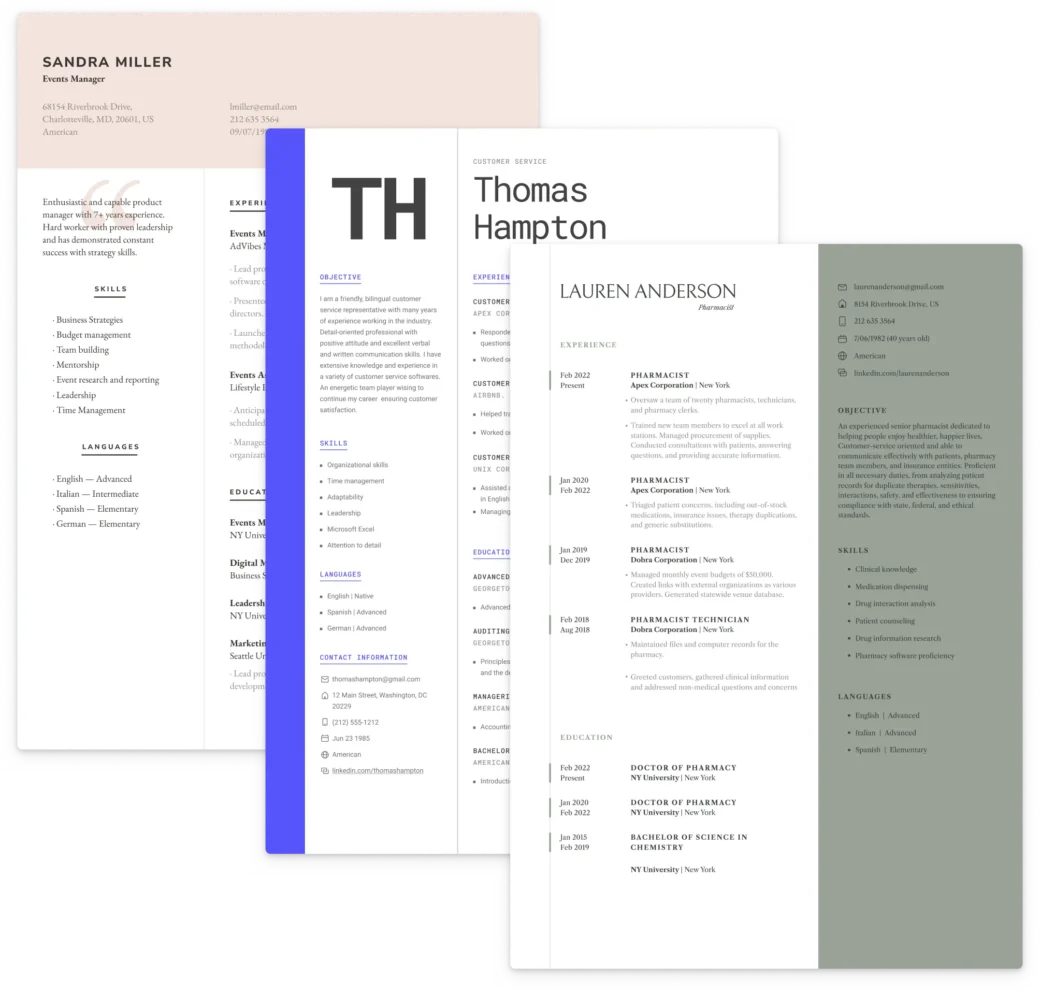Including your organizational skills should be a top priority for any resume at any stage of your career. These skills prove that you can effectively achieve company or project goals, both short-term and long-term.
Organizational skills are key for any position in any sector, which is why you should take advantage of our free resume builder to help you organize these skills on your resume.
With this in mind, let’s dig into the meaning of organizational skills and why they matter. This article will outline some organizational skills examples and show you how to include these abilities when writing your resume, with some examples to guide you.
What Are Organizational Skills?
Organizational skills are the ability to manage time, tasks, projects, responsibilities, and people. They include knowledge of how to perform a task personally or supervise its performance by others.
These skills are important for success in any career and can be learned. Some common types of organizational skills include:
- Time management: Skills like time management help you determine which activities must take priority over others and how long each task will take you to complete.
- Task management: Having this skill helps you prioritize major milestones as well as break down larger projects into smaller tasks with specific deadlines for completion.
- Responsibility management: This skill involves recognizing who is responsible for each step in a project or process and ensuring that everyone involved understands their role in achieving the goal(s).
List of the 10 Best Organizational Skills
From being able to manage and prioritize tasks to keeping your physical workspace clean, here are some of the organizational skills that employers value most when hiring new talent or promoting from within their ranks.
Collaboration
Collaboration is a key part of any job. It’s about working together and achieving goals as a group, whether that’s in the office or out in the field.
Collaboration can also fall under teamwork skills, but it is also a key aptitude to ensure you are organized in your workplace.
Communication
Because communication skills are so important and can be used in every job, it’s worth taking the time to learn them.
Learning how to listen carefully is especially important in any job where there’s lots of back-and-forth discussion between colleagues or clients/customers (e.g., in a sales representative role).
You also need to be able to speak clearly so that people understand what you say without having to ask for clarification.
Delegation
Delegation is a skill that allows you to get more done in less time. It helps you focus on the things that are important and not waste time on the things that are not.
This guarantees that your team member has all the necessary information to successfully complete a task without having to ask questions every step of the way.
You can use AI tools and other software to paint a clearer picture of how to organize your team’s tasks.
Goal setting
Goal setting shows employers you’re focused, proactive, and results-oriented. Including it on your resume demonstrates that you can plan strategically and follow through with measurable outcomes.
In fact, according to Mooncamp, 90% of companies that use an Objectives and Key Results framework showed improved communication and strategy execution. This shows how valuable goal setting is to employers and businesses.
Physical organization
Physical organization skills are the ability to arrange things logically and efficiently. It encompasses the task of organizing your physical workspace and keeping it clean and in order.
When your workspace is organized well, it’s easier to focus on the tasks at hand instead of wasting time wondering where all your pens and papers have gone.
Planning
If you want to be successful, mastering how you plan out your time and goals is one of the most important organizational skills.
Making a list of things to do or writing out a plan of action can help you avoid stress and save time.
Prioritizing
Many people find it difficult to determine which task needs to be addressed first. The ability to prioritize is a skill that allows you to focus on the most important tasks at hand.
Employers often favor candidates who seem confident in their ability to handle multiple responsibilities at once, as well as those who can clearly articulate how they complete various tasks in order of importance.
Problem-solving
Problem-solving is a decision-making process that identifies and addresses the root causes of problems.
It’s a skill that involves analyzing a situation, generating alternative solutions, choosing the strongest option, and taking action to solve the problem.
Time management
Time management is the ability to manage tasks and stay organized. Employers look for candidates who can employ these organizational skills at work because an employee who can’t do so will likely be late or miss deadlines.
Developing good time management skills includes prioritizing the tasks you need to complete each day.
Project management
Adding project management to your resume shows your ability to plan, prioritize, and deliver results on time and within budget. Highlighting this skill on your resume signals leadership, accountability, and cross-functional coordination.
This can be especially useful for a position as a project manager or a product manager.
Examples of Organizational Skills on a Resume
You’re nearly ready to prove that you are an organized candidate to any hiring manager out there. However, it’s always a great idea to look over some examples of how organizational skills should be added to a resume first.
Take a look at the following examples of different resume sections to give yourself some inspiration for listing your organizational qualities.
Resume summary
The summary should include your strongest points and most recent experience.
Seasoned professional with 10+ years of experience, excelling in strategic planning, effective prioritization, and meticulous time management. Demonstrated ability to manage multiple tasks and promote team collaboration.
Resume objective
More suited to candidates who are just starting out, an objective should outline your organizational qualities that can benefit the company you are applying to.
Organized and detail-oriented professional with expertise in prioritizing, planning, and time management. Seeking a project coordinator role in the tech industry to leverage these skills for driving efficiency, streamlining processes, and achieving successful outcomes. Committed to delivering high-quality results within tight deadlines to contribute to organizational success.
Resume experience section
This is where the bulk of your achievements and responsibilities will be outlined, and your organizational skills can be woven in throughout.
Experience
Project Manager | ABC Company, New York, NY | July 2019 – Present
- Directed cross-functional teams and improved project completion rates by 30%.
- Harnessed exceptional organizational skills to managed 15+ concurrent projects across 5+ time zones.
- Implemented a streamlined project tracking system that enhance communication.
- Increased efficiency by 20% after optimizing resource allocation, leading to a 20% increase in efficiency.
- Set clear milestones that led to on-time, under-budget project delivery.
Operations Manager | XYZ Corporation, San Francisco, CA | January 2015 – June 2019
- Increased operational efficiency by 25% through strategic planning.
- Led process reengineering and promoted organizational coherence.
- Developed a task prioritization system that reduced delivery times by 15%.
- Managed a team of 20+ and guaranteeing adherence to deadlines and fostering collaboration.
- Coordinated logistics and successfully reduced supply chain disruptions by 18%.
Resume skills section
Rather than just listing your skills, you can describe them a little more in-depth in a section such as this.
Key skills:
- Strategic Planning: Introduced quarterly planning cycles that helped leadership anticipate risks and adapt to market changes faster.
- Task Prioritization: Reorganized workflows to prioritize high-value tasks, increasing overall performance.
- Time Management: Coordinated overlapping project timelines by setting clear checkpoints, which minimized last-minute delays.
Each example provides data and a clear description of how the candidate uses or will use their organizational skills to complete their tasks.
If you can include these types of skills in the different sections of your resume, just as we have shown you in these examples, you’ll definitely be the stand-out candidate!
How To Add Organizational Skills to Your Resume
Planning and organizing skills are transferable skills, which means that they can be listed on your resume regardless of whether or not you’re applying for an organizational role.
There are several ways you can add organizational skills on a resume, including:
- Using organizational skills to describe yourself in your resume summary or objective.
- Making a list of these abilities in the ‘Skills’ section of your resume
- Adding examples of your organizational skills under individual job descriptions in your ‘Experience’ section
This last option is perhaps the best place to show off organizational skills examples. In a job description, you can outline quantifiable examples of where your abilities came into play and how they helped you carry out your responsibilities in previous roles.
It’s also important to include organizational skills on your resume that match keywords in the job description, as this will make you stand out more as a strong candidate to recruiters.
Additionally, you should always use bullet points to illustrate your organizational skills in the workplace within a job description, as you can see in many of our resume templates.
Key Points
There are several types of key organizational skills that you can include in your resume to catch a hiring manager’s attention.
Simply follow the tips we mentioned:
- Understand the difference between the types of organizational skills
- Include the top skills that are most relevant to the open position.
- Add quantifiable data when mentioning relevant experience.
Now that you know what some of the top organizational skills are, take advantage of our free AI skills generator to add them neatly into your resume with ease.

Build your perfect resume with ease
Craft the perfect resume effortlessly with our builder. Get started today!
Related Posts

